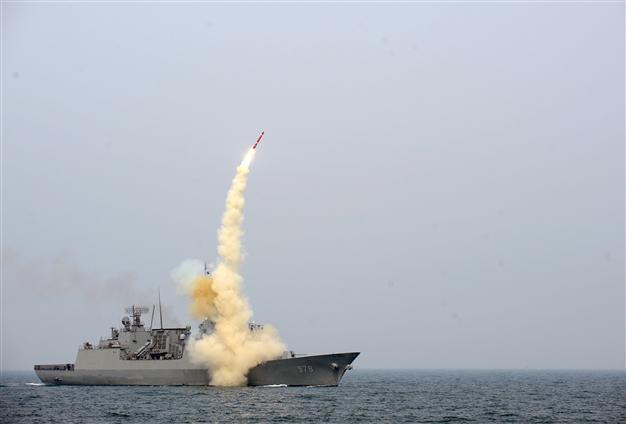South Korea flexes missile power after North test
SEOUL – Agence France-Presse

This undated picture released on February 14, 2013 in Seoul by South Korean Defence Ministry shows the test-launch of its new cruise missile being fired from a warship.
Two days after North Korea's nuclear test, South Korea signalled Thursday the deployment of a new cruise missile capable of a precision strike on members of Pyongyang's high command.The defence ministry called in reporters for a special video presentation of the recently deployed missile being fired from a warship and a submarine.
"The cruise missile unveiled today is a precision-guided weapon that can identify and strike the office window of the North's command headquarters," ministry spokesman Kim Min-Seok told reporters.
It has "deadly destructive power" that could "restrain the enemy headquarters' activities" during wartime, Kim said.
South Korea's military has been on a heightened state of alert since Pyongyang first threatened the nuclear test which was eventually conducted on Tuesday.
It was the North's third test, following previous detonations in 2006 and 2009, and seismic data suggested it was significantly more powerful.
The test appears to have galvanised South Korea into flexing its military muscle and highlighting its own technological prowess.
"With this missile, we could hit any facility, equipment or individual target in the North anywhere, at any time of our choosing," army Major General Ryu Young-Jeo said of the cruise missile.
On Wednesday, South Korea said it would accelerate the development of longer-range ballistic missiles that could also cover the whole of North Korea.
In October last year, South Korea reached a deal with the United States to almost triple the range of its ballistic missile systems -- with Seoul arguing it needed an upgrade to counter the North's own missile development.
The United States has 28,500 troops in South Korea and guarantees a nuclear "umbrella" to deter attacks. In return, Seoul accepts limits on its ballistic missile capabilities.
The defence ministry also said it would speed up the deployment of a "kill chain" system capable of detecting, targeting and destroying North Korean missiles.
















